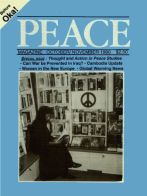
Peace Magazine Oct-Nov 1990, page 19. Some rights reserved.
Search for other articles by Bonnie Constable here
Search for other articles by Amir Hussain here
Several years ago, I took the undergraduate course, "Introduction to the Study of Peace," at McMaster University. The content of the course changed my ideas, especially about Nicaragua, Vietnam, and American militarism. But the major effect of the course that leading to action came from the format of the teaching and leaming experience. From the beginning the Students and professors worked together to discuss issues, present information and determine the course content. This presented an unwelcome challenge to some students who preferred the teaching style of "I'll talk and you listen," but to me it was like a breath of fresh air, motivating me to considerable involvement.
After I completed the course, the instructors asked me to be a facilitator for the course. I did so fortwo years. Through my work as a facilitator of small groups in the course I began to learn about non-hierarchical leadership of small groups. My experience there played a part in my being hired by Amnesty International (A.I.) as their Membership Education Coordinator. In this position I train and support volunteer facilitators and play a major role in the training portion of annual and regional meetings. I have continued to study human interaction, consensus building, conflict resolution, and the appreciation of differences.
This may seem a long way from war in Palestine and Vietman and genocide in Central America but it is part of the work that could eventually lead us to a world of peace and justice. A.I. members work toward the elimination of torture and the death penalty and for the release of prisoners ofconscience. They can work more effectively if they take the time to examine the interpersonal relations in their groups and encourage full participation indecision-making. The facilitation program that I now coordinate works toward that goal.
Some years ago, when I was at University College, at the University of Toronto, I chose two courses on religion and peace, simply because they fit into my schedule. The instructor was the Rev. Dr. William Kiassen. Since I've no doubt already irked Bill by using his full title (he hates titles), I don't suppose he'll get any angrier if I say that Bill reminds me of a sentient Burl Ives. In retrospect, I mustconfess that taking his courses on peace studies was one of the worst things I could have done. There I was, a simple undergraduate, worried that Canada was being left behind in the arms race, that we weren't pulling our weight in NATO, that we couldn't even guard our own waters, and that were were in terrible danger from the Red Menace in our backyard. Into this void came Bill, teaching me all Sorts of dangerous ideas like love, peace, justice, humanity, compassion, and nonviolence. Socrates was killed for corrupting the youth of his time with similarly radical ideas.
In his course on the biblical theology of peace, Bill challenged me to find the roots of peace and nonviolence in my own tradition, Islam. Much to my chagrin, I found abundant examples and so was forced to rethink my views. He did more than that. Bill challenged me to put my thoughts into action. As a result, I am now a member of the Fellowship of Reconciliation, a member of the Toronto executive ofScience for Peace, and the executive secretary of the World Conference on Religion and Peace/Canada. All because those courses in peace studies fit into my schedule.

Peace Magazine Oct-Nov 1990, page 19. Some rights reserved.
Search for other articles by Bonnie Constable here
Search for other articles by Amir Hussain here